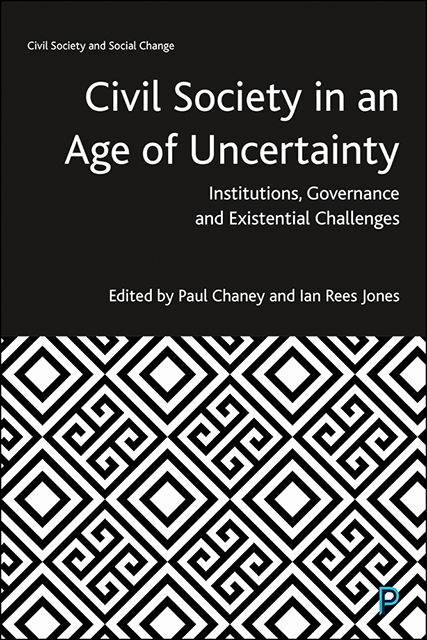Book contents
- Frontmatter
- Contents
- List of tables and figures
- Notes on contributors
- Acknowledgements
- 1 Introduction: Locating civil society
- 2 Existential challenges
- 3 Civil society and the governance of city region economic development
- 4 Civil society, pandemic and the crisis of welfare: exploring mixed economy models of welfare in domiciliary adult social care in a devolved UK
- 5 The contemporary threat to minority languages and cultures: civil society, young people and Celtic language use in Scotland and Wales
- 6 Digital threat or opportunity? Local civil society in an age of global inter-connectivity
- 7 Democratic decline? Civil society and trust in government
- 8 Xenophobia, hostility and austerity: European migrants and civil society in Wales
- 9 Meeting the challenge? Prospects and perils for civil society in the twenty-first century
- Index
9 - Meeting the challenge? Prospects and perils for civil society in the twenty-first century
Published online by Cambridge University Press: 16 June 2023
- Frontmatter
- Contents
- List of tables and figures
- Notes on contributors
- Acknowledgements
- 1 Introduction: Locating civil society
- 2 Existential challenges
- 3 Civil society and the governance of city region economic development
- 4 Civil society, pandemic and the crisis of welfare: exploring mixed economy models of welfare in domiciliary adult social care in a devolved UK
- 5 The contemporary threat to minority languages and cultures: civil society, young people and Celtic language use in Scotland and Wales
- 6 Digital threat or opportunity? Local civil society in an age of global inter-connectivity
- 7 Democratic decline? Civil society and trust in government
- 8 Xenophobia, hostility and austerity: European migrants and civil society in Wales
- 9 Meeting the challenge? Prospects and perils for civil society in the twenty-first century
- Index
Summary
The chapters in this edited collection have examined how the uncertainties of the age present diverse challenges to civil society at the beginning of the twenty-first century. We have drawn on a wide range of studies from WISERD’s Civil Society research programme. The first part of this concluding chapter summarises the different existential challenges with reference to the principal findings of each study and how they link to civic stratification. The second part outlines the common themes emerging from this volume and the associated prospects and perils for civil society organisations.
Principal findings, existential challenges and civic Stratification
Drawing upon David Lockwood’s (1996) conceptualisation, the present volume underlines how the existential challenges and the uncertainties facing civil society impact on civic stratification in the form of civic deficit and exclusion as well as civic expansion and gain. Lockwood posits that ‘the institutional unity of citizenship, market and bureaucratic relations is central to social cohesion’ (1996: 531). However, in a specific and qualified sense, the studies presented here point to the demise of institutional unity of citizenship. This is because of the global trend of state decentralisation and the rise of meso – or ‘regional’ – governance. Lockwood cannot be blamed for not foreseeing the full impact of this. He did, however, view demands for constitutional reform as a mode of civic expansion (p 535). His seminal work was formed in an era largely characterised by what Wimmer and Glick Schiller (2002: 301) term ‘methodological nationalism’, or the assumption that the state-wide practices are the natural social and political form of the modern world. As this volume’s findings illustrate, devolution in the UK is leading to the territorialisation of welfare citizenship, trust, identity and rights (see Chaney 2013, 2015, 2021c). For so-called ‘sub-state’ nations such as Wales and Scotland, the present may be a stepping-off point, a transitional stage on the way to independent statehood. What we do know from the studies in this volume is that the rise of territorial electoral politics and meso-government is significant because prevailing policy approaches in each UK nation are grounded in the different ideological orientations of the dominant parties.
- Type
- Chapter
- Information
- Civil Society in an Age of UncertaintyInstitutions, Governance and Existential Challenges, pp. 186 - 203Publisher: Bristol University PressPrint publication year: 2022



